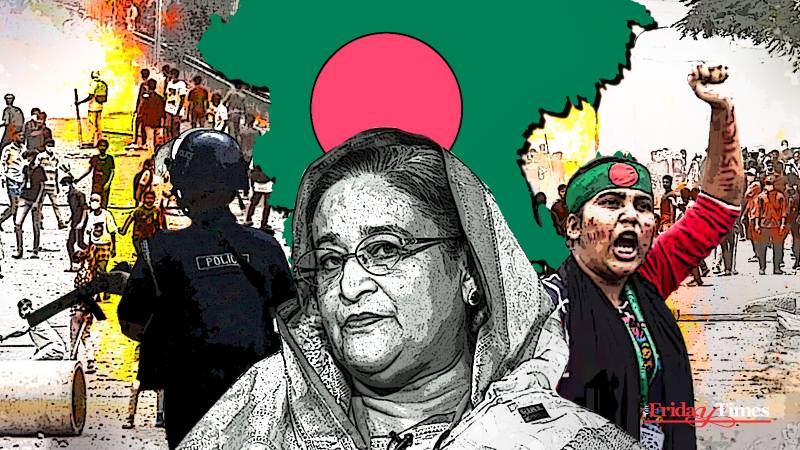Background
A coup in Bangladesh, especially one that disrupts the current government, could have significant implications for India due to the close geopolitical, economic, and security ties between the two countries. Bangladesh and India share a long and complex history, with Bangladesh being a key regional ally. The government of Prime Minister Sheikh Hasina, in power since 2009, has been largely pro-India, fostering strong diplomatic and trade relations. A coup that replaces Hasina’s government with a regime less favorable to India. A new government might align more with other regional powers like China or Pakistan, reducing India’s influence in Bangladesh. If the government becomes more Islamist-leaning, it could undo many of the bilateral agreements that exist, impacting everything from security cooperation to trade.
Possible Ways Bangladesh’s Coup Could Impact India’s Security
Rise of Islamist Extremism
A government less aligned with India’s secular and anti-terror stance could allow Islamist groups, previously curtailed under Sheikh Hasina’s leadership, to resurface and gain influence. Radical elements could spill over into India’s border regions, which are already vulnerable due to socio-political unrest. If extremist groups, like Jamaat-e-Islami or others, gain a foothold, it could fuel cross-border terrorism and destabilize India’s security in the northeastern states.
Radicalization and Border Tensions
Bangladesh’s border with India is notoriously difficult to monitor, and political turmoil could see an increase in illegal arms smuggling, drug trafficking, and human trafficking. Bangladesh’s shift towards a more radical or hostile government could also worsen border disputes, leading to skirmishes and militarization along the India-Bangladesh frontier.
Security Concerns
The Indian northeastern states, including Assam, Tripura, and Meghalaya, are closely connected to Bangladesh both geographically and socio-culturally. A coup or political instability in Bangladesh could lead to a surge in illegal immigration into India’s northeastern states, potentially exacerbating tensions related to identity politics and resource-sharing in these already sensitive regions.
Historically, insurgent groups operating in India’s Northeast have sought sanctuary in Bangladesh. Under Sheikh Hasina, Bangladesh has cooperated with India in eliminating these sanctuaries. A new regime may not be as willing to crack down on these groups, allowing cross-border insurgency to rise again.
Economic Implications
India is heavily invested in infrastructure projects in Bangladesh, including road, rail, and port connectivity under initiatives like the BBIN (Bangladesh-Bhutan-India-Nepal) corridor. A less cooperative government could slow down or completely halt these projects, which are crucial for India’s Act East policy and for accessing markets in Southeast Asia. Bangladesh is a key trading partner for India, especially in terms of exports and regional connectivity projects. Bilateral trade between the two countries has been growing, with India exporting goods like cotton, machinery, and automobiles. Any political upheaval could result in disruptions to trade routes, higher tariffs, or the termination of beneficial trade agreements.
Any large-scale political upheaval in Bangladesh could result in a humanitarian crisis. If a coup were violent or led to widespread unrest, it could trigger a refugee influx into India, particularly into West Bengal and Assam. This would not only strain India’s resources but could also fuel communal tensions and complicate the already volatile situation concerning citizenship and illegal immigration in the region.
Weakening of Anti-Terrorism Cooperation
A new Bangladeshi government might be less committed to fighting terrorism in the region. This could undo years of collaboration between Dhaka and New Delhi, allowing extremist networks to operate more freely. India may lose critical intelligence-sharing mechanisms, resulting in a resurgence of militancy in its border areas.
The Choice Ahead for India and Bangladesh’s Future
As Bangladesh stands on the cusp of potential political transformation, India must weigh its options carefully. The potential rise of extremism, the resurgence of insurgent groups, and the risks of unregulated migration are clear threats to India’s security and stability, particularly in its northeastern states. Moreover, a realignment of Bangladesh’s foreign policy towards China or Pakistan could shift the balance of power in South Asia, challenging India’s regional influence. However, while these threats are real, the path forward remains uncertain.
Conclusion
Should India adopt a more defensive approach, bolstering border security and strengthening counter-terrorism measures, or should it continue diplomatic efforts to foster stability and cooperation with Bangladesh? These are questions that the reader must consider in light of the potential fallout.
The choice India makes now will have lasting consequences for its security, its role in South Asia, and its relationship with a key neighbor. The ultimate decision rests not only with policymakers but with how the public and stakeholders envision India’s role in shaping the region’s future. How should India balance its security concerns with the need for diplomacy and regional cooperation?
The answer lies in the complex dynamics between caution and engagement, and it is up to each reader to decide which path is most prudent for India moving forward.


